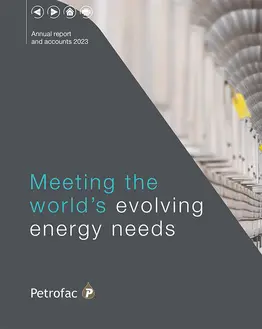Governance
Risk management
We operate in challenging environments and understand that risks are an inherent part of our business. Identifying and managing risks and opportunities is key to the successful delivery of our strategy.
Our industry knowledge and insight, coupled with the right set of tools and processes, help us understand the factors that lead to risk, and enable us to manage them effectively.
Our system of risk governance comprises several committees and management processes which bring together reports on the management of risk at various levels. The Group Executive Committee is responsible for the oversight of the Enterprise Risk Management framework agreed by the Board, including review of Group policies and the management of the Group’s Delegated Authorities.
Strategic risks
- Adverse geopolitical and macro-economic changes in key geographies
- Low order intake
- Failure to deliver strategic initiatives
- Failure to deliver energy transition strategy
1. Adverse geopolitical and macro-economic changes in key geographies
The impact of adverse geopolitical changes in our key geographies includes risks to the successful delivery of our strategy, our operations and associated impact on margins, the safety of our people, security issues, material logistics and travel restrictions. The Group’s backlog is concentrated in emerging markets, which may increase our vulnerability to adverse geopolitical events.
Mitigation and management
The Group Executive Committee and the Board actively monitor geopolitical developments and seek to avoid or minimise our exposure to jurisdictions with risk levels beyond our appetite. A detailed risk analysis is conducted before entering any new country and while pursuing and executing projects in new geographies.
We have good experience in project execution and maintain positive relationships with key stakeholders. Careful consideration is given to contractual terms and security conditions through our detailed risk review process, and we seek external advice on specialist issues as required.
The delivery model is modified to suit each project and we limit exposure to single sources of supply and service. We limit our fixed asset commitment within each contract and closely monitor and manage our cash flow and commitments.
Our Business Continuity Management System considers response to and recovery from geopolitical incidents. There is also continued focus on evacuation and emergency response. Our operations are assessed and executed in accordance with our Security Policy and Security Standards.
In 2023, we continued to evaluate any residual impact of the ongoing situation in Ukraine, and the new developments in the Middle East region. This involved keeping our people and operations safe, ensuring we remained compliant with sanctions, and carefully monitoring the global supply and logistics scenario.
Assessment: INCREASED
There was an increase in our risk profile. This was primarily driven by the October 2023 attacks in Israel and the subsequent conflict which triggered significant military activities in this region.
Consequently, increased tension in the wider Middle East region has been observed and the risk of further escalation remains. Whilst the impact from the continued conflict between Russia and Ukraine has reduced and our exposure to these countries is very low, commodity escalation and new sanctions unsettled markets and created new compliance requirements for the Group.
Based on the above, it is possible in the coming months there could be some impact in the markets affecting commodity prices and logistical routes, which will need to be carefully monitored.
2. Low order intake
The risk is that our clients exercise capital discipline, which impacts the demand for our services through the cancellation or delay of planned investments. The potential impact is that the Group could fail to deliver its anticipated backlog and growth targets.
The Group wins most of its work through a competitive bidding process, and as competition increases, there is a risk that we could fail to maintain differentiated margins.
Mitigation and management
Our order intake is driven by our strategy, the development of which is overseen by the Board. Our service lines work together to identify, review and win opportunities. We regularly analyse our business development activities, bid-to-win ratios, and our competition.
In 2023, we continued to focus on addressing evolving client needs in areas such as increased in-country value and improved sustainability performance. We further enhanced our competencies in energy transition, securing contracts with key customers.
We see a healthy and diverse pipeline of bidding opportunities in the coming years across markets and geographies.
Assessment: DECREASED
The decrease in the principal risk was due to the significant level of new contract wins secured in the year, including the first two contracts awarded under the six-project US$14 billion multi-year Framework Agreement with TenneT in support of their 2GW programme.
In addition, the E&C division secured three major contracts with ADNOC in the UAE and Sonatrach in Algeria, and an additional contract in Lithuania with Orlen Group.
Furthermore, Asset Solutions secured a series of contract renewals and new work resulting in total annual book-to-bill of 1.1x in 2023. As a result, the Group’s backlog increased to US$8.1 billion (2022: US$3.4 billion).
Furthermore, the outlook remains positive, mainly driven by new investments being undertaken by customers in both the conventional energy and energy transition sectors, and good visibility of the pipeline for 2024 and beyond.
3. Failure to deliver strategic initiatives
Each of our strategic priorities is supported by various strategic initiatives that are overseen by senior management and the Board. To build enterprise value, we ensure each initiative is de-risked and respective success targets are met, assuring all stakeholders that we are pursuing an appropriate strategy capable of delivering shareholder value.
The impact is reflected in the appetite from new investors and, consequently, the market valuation of the Group.
Mitigation and management
Each strategic initiative is governed by a stage-gate process and overseen by the Group Executive Committee. The Board regularly assesses our strategic initiatives and overall strategic plan to satisfy itself that the right balance of risk, capability, and reward is maintained. We conduct detailed sensitivity analysis to assess the robustness of our plans.
The Group Executive Committee reviews all material new business opportunities and projects, new country entries, joint ventures, investments, acquisitions and disposals.
In a challenging environment, we continued to deliver our key strategic initiatives in 2023.
Key achievements for the year included:
- Rebuilt a large, high-quality order backlog
- Good progress in completing legacy contracts and resolving open contractual discussions
- Adjusted the operating model and made key strategic hires to ensure appropriate leadership support and project governance
Assessment: NO CHANGE
We made progress across all our strategic initiatives, and the risk remained stable during 2023.
4. Failure to deliver energy transition strategy
Due to climate change and the energy transition, our markets are changing, and the portfolios of our clients are going through a major transformation. Our new energy transition delivery unit was established to respond to this change, and the Group has outlined a medium-term ambition for 20% of revenue to come from this sector. An inability to meet changing market needs will limit our future growth and would hinder our commitments with regards to our response to climate change.
Mitigation and management
Petrofac’s energy transition projects focus on five clearly defined segments of the market, namely offshore wind, CCUS, hydrogen, waste-to-value and emissions reductions where we have a strong track record and relevant experience.
The growth will be facilitated by: partnering in relevant technologies and with established developers; monitoring relevant government policies; and supporting the energy transition delivery unit with technical expertise to successfully execute and deliver energy transition projects.
In 2023, we:
- Further developed our strategic partnership with Hitachi Energy in offshore wind, securing the first two contracts awarded under the six-project US$14 billion multi-year Framework Agreement with TenneT in support of their 2GW programme
- Successful in securing strategic early-stage contracts in HVAC offshore wind, CCS, hydrogen and waste-to-value sectors aligned to our energy transition strategy
- Engagement with European fabrication yards to explore potential partners to support future HVAC contracts and onshore modular energy transition projects
- Continued improvements in our ESG performance, as demonstrated by positive ESG ratings (e.g. AA rating from MSCI)
Assessment: DECREASED
The risk decreased in 2023 due principally to the first two contracts secured (with a value of approximately US$2.8 billion) under the six-project US$14 billion multi-year TenneT Framework Agreement and the ADNOC Habshan CO2 award. Also, good progress made in carbon capture sector with early engineering awards for CCS projects for offshore pipelines, cement and energy from waste emitters.
Operational risks
- Operational and project performance
- Insufficient IT resilience
- HSE incidents
1. Operational and project performance
Our portfolio typically includes a relatively small number of high-value contracts, a larger number of lower-value contracts, and a sizeable oil and gas asset. Cost or schedule overruns on any of the high-value contracts, or operational issues affecting production within our key assets could negatively impact the Group’s profitability, cash flow and relationships with key stakeholders.
Mitigation and management
Key risks to project delivery are initially identified at the tender stage, through the risk review process by relevant risk review committees and escalated to the Group Executive Committee or the Board, as required. On award, detailed execution strategies are further developed.
During the execution phase, emerging risks and opportunities are managed through assurance, operational and project reviews. Lessons learned are cascaded through leadership lines and our quality initiatives are focused on a right-first-time approach.
In 2023, we continued to embed our technical support functions, ensuring the value assurance framework was integrated to govern all aspects of project delivery across our operations. We also engineered solutions to emerging production risks in IES, project recovery plans were maintained, and project delivery remained a significant area of focus for the Executive team and the Board throughout the year.
Assessment: INCREASED
Project and operational challenges continued during the year, as the small number of projects and the legacy portfolio continued to be executed and completed.
A difficult commercial environment resulted in write-downs of receivables and an increase in legacy project losses as a result of clients not fully reimbursing – or expected to reimburse – costs incurred or to be incurred on Covid-19 pandemic-affected projects
Project delivery was also adversely impacted by the increased difficulty in securing project guarantees, with the tightening of the overall guarantee market also contributing to this increased challenge.
2. Insufficient IT resilience
The Group’s performance is increasingly dependent on the ongoing capability and reliability of our IT platforms. We (as with all companies) continue to be exposed to external cybersecurity threats.
Mitigation and management
We operate a Group-wide cybersecurity programme and have a cloud strategy to maintain a resilient IT platform.
In 2023, we continued to improve our IT resiliency through:
- The successful implementation and migration from an on-premises EBS system to a cloud-based Oracle ERP system for Asset Solutions and E&C
- Adding artificial intelligence (AI) capabilities to our cybersecurity controls
- Continuing to run regular vulnerability assessments, penetration tests and Red Team exercises
We continued to align our information security management practice with the ISO 27001 standard and other best practices.
In 2024, cybersecurity remains a key priority in all our digitalisation initiatives, and we will continue our journey of continuous improvement in cybersecurity practices and protections.
Assessment: NO CHANGE
The risk remained stable during 2023.
3. HSE incidents
There are several factors that could impact our ability to operate safely. These include safety and asset integrity risks and they extend to a range of environmental risks. The risk is the potential harm to our people, and the commercial and/or reputational damage that could be caused.
Mitigation and management
Safety is fundamentally important and intrinsic to Petrofac’s behavioural DNA. It is governed largely by our operating framework, Group policies and systems that cover all elements of occupational health and safety, security, environmental and asset integrity programmes.
In 2023, we improved on an already strong HSE performance with further enhancements to the updated HSE strategy implemented in 2022. Key achievements for the year include:
- Increased focus on the Thai Oil Clean Fuels site where the fatality in our contractor community took place with leadership interventions and visits from senior management across all disciplines, increased HSE support at site delivering ‘boot camp training onsite and in the classroom’ and contractor interventions to support improvements
- Enhanced leadership visibility and oversight on site performance through site visits and safety scorecards
- Focus on driving safety in higher risk areas, embedding the use of the GreenRoad app which gives real-time performance feedback to the drivers and the transport manager
- Collaboration with contractors through annual performance reviews and rollout of Safety Hotspots at worksites to improve their respective safety performance
- Improved engagement with worksites and the use of digital technology, such as the Petrofac Go observation app, Journey Management Planning app and observation reporting tool
Assessment: NO CHANGE
Despite some high-potential incidents, including a fatality within our contracting community in the year, the risk remained stable in 2023 and was mitigated by the continued enhancement of our new HSE strategy implemented in 2022.
Financial risks
- Loss of financial capacity
- Misstatement of financial information
1. Loss of financial capacity
Failure to maintain adequate liquidity or provide guarantees to our customers could adversely affect our ability to deliver our strategy and may ultimately result in financial loss and/or ability to comply with our financial covenants. Costs of debt may rise as a result of rating agency downgrades or reduced access to funding. Access to funding is critical to our sustainability and future growth. Reduced access to funding could hamper the Group’s growth and/or adversely affect the Group’s financial performance.
Mitigation and management
As a result of the difficulty in securing guarantees and the resulting liquidity pressures, the Board appointed Aidan de Brunner as a Non-executive Director and established a Special Committee in December 2023 to undertake a financial and strategic review of the Group, and is currently progressing a comprehensive Financial Restructure. This seeks to strengthen the Group’s balance sheet, improve liquidity and secure performance and advance payment guarantees to support current and future workload.
The Group continues to carefully manage liquidity and its ongoing payment obligations and we ensure a minimum level of liquidity (as defined by bank debt facilities financial covenants) in the form of readily available cash, short-term investments, or committed credit facilities. To assist with this working capital management, we reduced cash held in joint ventures and in highly regulated jurisdictions during the year.
Debt, cash and liquidity balances are monitored on a daily basis. We typically prepare cash flow forecasts on a quarterly basis, aligned to our reforecast cycle, and rolling cash forecasts on a weekly basis to help manage liquidity and short-term forecasting.
Additionally, the Company’s lending banks have agreed to a number of rolling short-term deferrals of contractual amortisation payments while the Company progresses the financial restructuring. The Company continues to engage with its lending banks on extending these deferrals as required.
Assessment: INCREASED
The risk was assessed to have increased during 2023, due to the significant difficulties in securing performance and advanced payment guarantees, which resulted in delays in collecting progress invoices and advances on certain E&C contracts, and therefore significantly impacted the Group’s liquidity. These guarantees are critical to the continued going concern and viability of the business.
The Group received credit rating downgrades in late 2023 and 2024.
However positively, in late 2023 we secured performance guarantees (albeit with significant collateral) for two substantial E&C contracts awarded in 2023, which unlocks the release of milestone and progress payments on those contracts.
2. Misstatement of financial information
We execute complex projects in a dynamic environment across various jurisdictions with numerous clients. Our business performance and financial results reflect our current assessment of assumptions and financial estimates, however actual outcomes may vary. These may negatively impact investor confidence.
Mitigation and management
Our Financial Control Framework is designed so that adequate controls are identified, implemented and monitored throughout all our key financial activities. Adequacy of these controls is self-certified and reviewed by various assurance activities and overseen by the Audit Committee.
In 2023, we continued to improve our controls in this area with the ongoing implementation of a new Enterprise Resource Planning platform, which will be completed in 2024, in addition to a fully integrated centralised payment hub.
Furthermore, in response to the identified deficiencies in internal controls identified in the current and prior years, we continued to implement additional assurance activities. These included enhanced post balance sheet event reviews and specific verifications that contract revenue and cost forecasts, and consequently the financial statements, reflected the latest third-party advisor analysis where this had been provided and enhanced and increased post balance sheet enquiries.
The Board and management are committed to identifying the root cause of such incidents and will oversee a programme of work to address any cultural, behavioural or organisational design issues that may have contributed to the incidents.
Assessment: INCREASED
In 2023, control deficiencies within the business were identified, following another incident in 2022. Management performed additional assurance activities to satisfy itself that there were no other similar occurrences across the broader contract portfolio, including additional procedures performed by an independent third-party expert. Overall, the risk was assessed to have increased.
Legal and compliance risks
1. Breach of laws, regulations, and ethical standards
Non-compliance with laws, regulations and ethical standards due to failures in our compliance controls or unethical behaviour, including but not limited to bribery, corruption, money laundering, trade sanctions and labour rights, may result in fines and/or adverse impact on our reputation
Mitigation and management
We operate a Group-level Compliance Programme overseen by the Compliance and Ethics
Committee. We continued to enhance this proramme during 2023, including:
- Streamlining the due diligence process to focus on the risk-based approach
- Enhancing the gifts, entertainment and hospitality platform to ensure effectiveness
- More focus on managing trade compliance matters and Speak Up investigations
Priorities for 2024 will clearly focus on the ethics breaches identified, and the Board and management are committed to identifying the root cause of such breaches, informed by the findings of the investigations, and will oversee a programme of work to address any cultural, behavioural or organisational design issues that may have contributed to the incidents.
Executive management has also communicated with the wider organisation about the incidents to reinforce core expectations in relation to culture and conduct.
Other priorities include digitalisation of compliance risk management processes, streamlining third-party screening risk management strategies, progressing the Company’s ISO 37001 application and targeted training in support of new country entries.
Assessment: INCREASED
The overall risk level was assessed to have increased in 2023, notwithstanding the changes and improvements implemented following the SFO investigation, which concluded in 2021.
Compliance breaches in respect of the financial statements and information management were identified during the year and are detailed in the Audit Committee report.
Additionally, the Company appointed external advisors to undertake a thorough assurance review to check that the steps taken as part of the Group’s exit from its Russian operations in 2022 and 2023 complied with sanctions imposed from the end of February 2022 onwards, following Russia’s invasion of Ukraine, had been effective.
Despite the compliance measures put in place by management, instances of administrative non-compliance were identified and have been assessed to give rise to a UK enforcement risk. These have been notified to the relevant authorities and appropriate financial provisions recorded.
The Company has, from time to time over the last four years, received correspondence from claimant law firms making reference to the possibility of civil claims in connection with the now concluded SFO investigation into the Group. Last year, four claimant groups, representing mostly former shareholders, commenced civil claims against the Company in the UK. The claimants seek damages under s90A of FSMA 2000, which concerns the making of allegedly false, misleading or delayed statements and/or material omissions in its public disclosures. It is possible that further claims could be made in the future.
The merits, likely outcome and potential impact on the Group of any such litigation is subject to a number of significant uncertainties (and the litigation is still in very early stages) and as such, the Group cannot make any reliable assessment of the likely outcome or quantum of any such litigation as at the date of this disclosure.
People risks
1. Inadequate leadership and talent management
Our operations are heavily dependent on our ability to attract, retain and lead the right level of skilled and experienced personnel. Failure to do so could negatively impact our distinctive, delivery-focused culture, and prevent us from maintaining our operational capability and positive relationships with clients.
Mitigation and management
We remain confident that our policies to attract, retain, train, promote and reward our people are appropriate for the Group, and will enable us to meet our strategic goals.
In 2023, we leveraged our new resourcing plan to meet our future human capital requirements. These efforts were coupled with further improvements in our overall benefit structure and reward and remuneration initiatives.
Pathway Programmes were relaunched and LinkedIn Learning successfully rolled out to all employees.
Assessment: DECREASED
The risk has reduced during the year with a lower attrition rate and following the introduction of the new resourcing plan, we successfully hired approximately 3,000 new employees during the year, in addition to over 800 internal promotions, in response to the high level of new awards secured.








